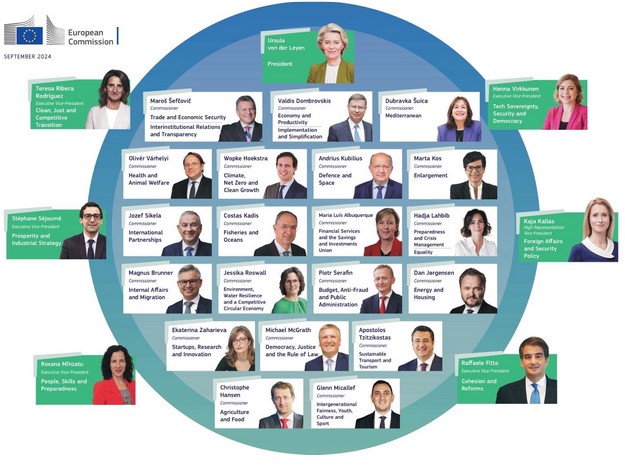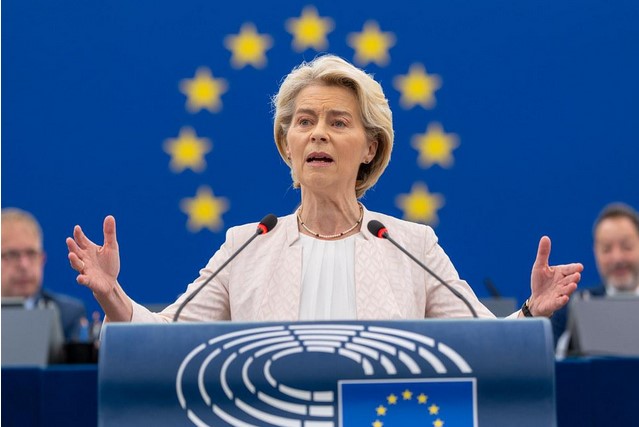President Von Der Leyen removed the post of Equality Commissioner from the new executive: a decision that caused consternation and concern among European voluntary associations.
Ursula Von Der Leyen will officially begin her term as head of the European Commission 2024-2029 on 1 December, but some critical questions are already looming. And it is not just the physiological diatribes to find a new political balance that has shifted to the right in this second term. There is also a serious shortcoming that has a symbolic dimension but could conceal wider and more worrying implications.
Indeed, among the delegations assigned to the 27 new European Commissioners, one is missing: that of Equality.
In a surprising decision, the President has abolished this important post which, for the past five years, was successfully held by the Maltese Helena Dalli.
There is no longer an autonomous ‘Equality’ portfolio; it has been dismembered and relegated to the remit of the new European Commissioner for Crisis Preparedness and Management, the Belgian Hadja Lahbib.
This is clearly not a problem of names or nationalities of the protagonists. The decision to relegate Equality to the secondary competences of a commissioner with many other competences is a huge step backwards from the commitments previously made by the European Union, which had made equality a central issue on its political agenda.
All the positive work done by Commissioner Helena Dalli until the end of November 2024 seems to have ended up in the dustbin. However, Dalli and her team had highlighted the enormous difficulties faced by disabled people and their families during the Covid19 pandemic and were successfully working on a reorganisation of work and welfare to try to protect the social rights of the most fragile. It had also broadened its scope to include gender inclusion policies, anti-racism schemes and LGBT equality. It dealt with the rights of Roma children, unaccompanied migrant minors, all situations of marginalisation and deprivation.
Today, the new Commission in Brussels no longer seems to care about these issues, which have been downgraded and included in an already overloaded portfolio of delegations, all of them assigned to former Belgian foreign minister Hadja Lahbib, who will manage them until 2029.
The protest of European Voluntary Associations
Dozens of human rights organisations across Europe have expressed their ‘shock and dismay’ at Ursula Von der Leyen’s decision to abolish the autonomous post of EU Equality Commissioner, calling it a ‘degradation’ of the fight against discrimination.
Among them is the protest by the European Disability Forum (EDF), an umbrella organisation of hundreds of small activist groups, which defends the interests of the 87 million disabled people in the European Union. Established in 1996, the EDF actively influences decisions concerning people with disabilities through regular advocacy channels with the European institutions, including the European Parliament, the European Commission and the Council of the EU.
This time, however, the European Disability Forum has had to back down, calling the removal of the Equality portfolio a ‘dangerous precedent’ that risks rolling back progress on disability rights, inclusion and anti-discrimination.
The Italian Federation for Overcoming Disability (FISH) also expressed its dismay at this decision, which President Vincenzo Falabella described as a cultural regression. The amalgamation of Equality in a broad and complex context such as ‘Crisis Management’ is a clear sign of disregard for people with disabilities. According to Falabella, ‘there are still too many prejudices to address this issue directly’, especially in a historical context in which inequalities are growing across Europe.
And a particularly serious worsening is taking place in Italy, where absolute poverty has tripled in the last fifteen years, while the number of billionaires has more than doubled. And where current immigration laws are giving rise to a resurgence of an anthropology of inequality, fuelled by nationalist and identitarian ideologies.
FISH strongly urges MEPs to take swift action to restore the autonomy of the Equality portfolio in the European Commission, underlining the importance of maintaining a clear and decisive focus on disability rights.
Europe’s top values in the spotlight
With this and many other recent decisions, Europe seems to betray its own principles. The European Union is founded on two pillars: equality and peace, values born to put an end to the horror of concentration camps, state racism and the exaggerated nationalisms that produced fratricidal wars. Today, however, these pillars are shaky. The rights of the weakest are not a priority and the prospect of greater socio-economic integration of these population groups is completely neglected.
In the background is the discussion on the immense historical debt that European colonialism owes to the rest of the world, which today attempts to mitigate by resizing the guilt of the European powers that for centuries invaded, occupied, plundered and exploited a large part of the planet. With the roles reversed, today it is the poor of these impoverished countries who flee to Europe, and the response of the Euro fortress is that the right to emigrate has become a crime.
Thus, the figure of the illegal and clandestine immigrant emerges, whom the state has the right to lock up in detention centres simply because of his or her place of birth.
Divisions are growing between the rich and the poor of the world; between those who can move freely for tourism or business and those who cannot; between those who are healthy and those who suffer from disabling illnesses; between those who are middle-aged heterosexual males and everyone else.
And in this complicated geopolitical context, do we really think that the European Union can do without an Equ ality Commissioner?



